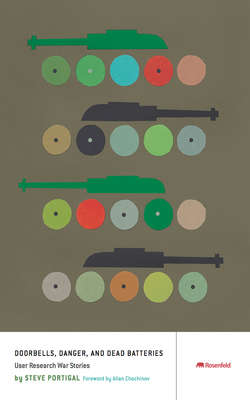Читать книгу Doorbells, Danger, and Dead Batteries - Steve Portigal - Страница 11
На сайте Литреса книга снята с продажи.
CHAPTER 1
ОглавлениеThe Best Laid Plans
Julia Thompson: For Want of a Shoe
Alicia Dornadic: Don’t Hate on a Tinkler
Dan Szuc: Shanghai Surprise
Sean Ryan: Pockets Full of Cash
Mary Ann Sprague: Be Prepared
George Ressler: Skyfall (or a View to a Kill)
Tamara Christensen: What the Hell? Don’t You Knock?
Jenn Downs: Burns, Bandages, and BBQ
Takeaways
Semper Gumby is an unofficial motto for the United States Marine Corps (and other military services). Adopted at a grassroots level, it references the official motto Semper Fidelis (Always Faithful), while invoking the built-in flexibility of that green clay character. It declares that successful military personnel must adapt to changes.
Some user researchers try to manage the complexity of research by crafting detailed plans and developing artifacts to support the act of planning, such as checklists, observation worksheets,1 special notebooks for note-taking, and what’s-in-your-bag fieldwork kits.2 I put together my own set of re-purposable documents3 to supplement Interviewing Users.
Planning, of course, is essential to successful fieldwork. And these artifacts can facilitate planning. But they can also imply, by their existence, if not their design, that things are going to go a certain way. Does the plan set you up to adapt, or are you in trouble when there’s a snafu?4 Sometimes these plans imply a simplicity to research, which may be more about selling the idea of research than actually empowering people to deal with the realities. Researchers learn—typically after losing some data—to bring extra batteries, to remind themselves to start the recording gear, to double-check they’ve brought along incentives and releases and interview guides and prototypes, and so on. But as these stories remind us, there’s no complete set of circumstances that can be fully planned for. Should Dan Soltzberg (from his story in Chapter 9, “People Taking Care of People”) have brought an extra pair of pants with him? There is no plan that can fully allow for the range of circumstances that can (and will) arise in and around fieldwork.5 Semper Gumby, indeed.
So you have to plan. And yet planning can never be sufficient and even worse may lull you into a state of blithe overconfidence. Instead, think about the total experience of fieldwork as a system, or “a set of elements or parts that is coherently organized and interconnected in a pattern or structure that produces a characteristic set of behaviors.”6
Typically, you use systems thinking when you consider your research data and when you design solutions, but what about the actual experience of doing fieldwork? It’s a complex system. Thinking about the interconnectedness between different elements will help you anticipate some points of failure (bring more than enough batteries), but it should also help you accept that failures of some form or another are inevitable (but don’t bring extra pants) and sometimes lead to other failures (a phenomenon known as cascading failure).
NOTE EVERYBODY NEEDS TO PLAN
I led a training workshop for a group of junior user researchers. I recommended using the field guide as a place to hold a number of critical process reminders (e.g., turn on the recording devices, sign the release form, etc.). One of the students reported, erroneously, to her boss, with an eye-roll and sigh, “He’s telling us to turn on the camera.” Her boss, a highly seasoned researcher, unaware of the higher order point I was attempting to teach, reminded her, “I’ve been doing this work for a long time, and I still forget to turn on the camera.”
In this chapter, Julia Thompson, Tamara Christensen, and Jenn Downs experience cascading failures. Alicia Dornadic and her team try—and fail—to plan for the most basic of human needs. Dan Szuc and Mary Ann Sprague find that a small mistake has significant consequences, and they each explore how to adapt. Sean Ryan fails to plan adequately, and he works in blissful ignorance without consequence and only realizes later that he might have taken a different approach. George Ressler anticipates a point of failure and designs his approach to prevent that, but still must adapt on the fly. Each of these researchers, flawed human beings all, negotiate the slippery, shifting balance between intentionality and flexibility.
